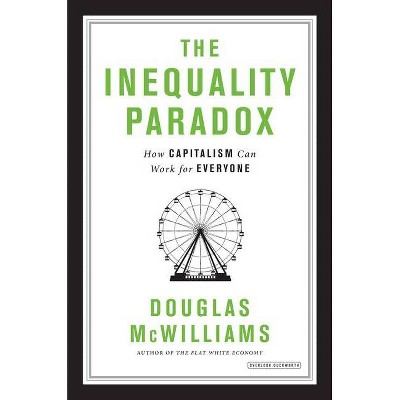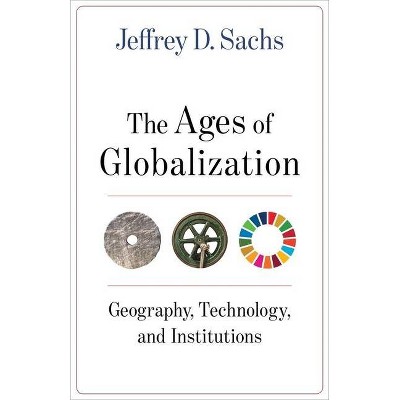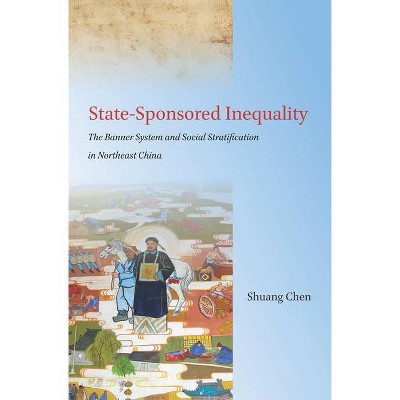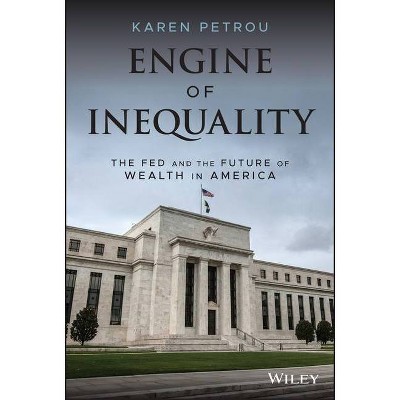The Globalization of Inequality - by François Bourguignon (Hardcover)
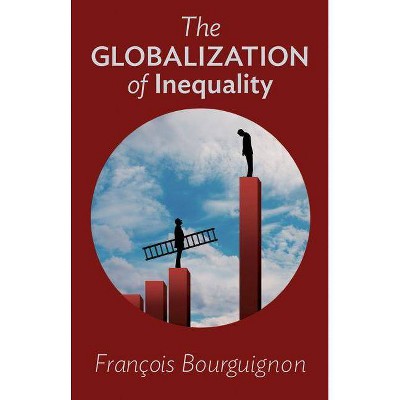
Similar Products
Products of same category from the store
AllProduct info
<p/><br></br><p><b> Book Synopsis </b></p></br></br><p><b>Why national and international equality matter and what we can do to ensure a fairer world</b> <p/>In <i>The Globalization of Inequality</i>, distinguished economist and policymaker François Bourguignon examines the complex and paradoxical links between a vibrant world economy that has raised the living standard of over half a billion people in emerging nations such as China, India, and Brazil, and the exponentially increasing inequality within countries. Exploring globalization's role in the evolution of inequality, Bourguignon takes an original and truly international approach to the decrease in inequality <i>between</i> nations, the increase in inequality <i>within </i>nations, and the policies that might moderate inequality's negative effects. <p/>Demonstrating that in a globalized world it becomes harder to separate out the factors leading to domestic or international inequality, Bourguignon examines each trend through a variety of sources, and looks at how these inequalities sometimes balance each other out or reinforce one another. Factoring in the most recent economic crisis, Bourguignon investigates why inequality in some countries has dropped back to levels that have not existed for several decades, and he asks if these should be considered in the context of globalization or if they are in fact specific to individual nations. Ultimately, Bourguignon argues that it will be up to countries in the developed and developing world to implement better policies, even though globalization limits the scope for some potential redistributive instruments. <p/>An informed and original contribution to the current debates about inequality, this book will be essential reading for anyone who is interested in the future of the world economy.</p><p/><br></br><p><b> From the Back Cover </b></p></br></br><p>"In this season of tomes on inequality, Francois Bourguignon's book stands out for its ability to combine global sweep with attention to minutiae, its passionate concern for the world's burgeoning inequality, and dispassionate analysis of the causes behind these growing disparities. An amazing amount can be learned from this slim volume on inequality within and across nations."<b>--Kaushik Basu, chief economist and senior vice president of the World Bank</b></p><p>"Francois Bourguignon once again demonstrates his position as one of the world's leading thinkers on inequality. In this book, he stresses that careful attention must be paid to the distinction between global and national inequality. Bourguignon sets forth policies for achieving both convergence of global standards of living and economic efficiency, and he warns that inequality profoundly threatens social stability. May the hopeful part of his message prevail."<b>--Gary Fields, author of <i>Working Hard, Working Poor: A Global Journey</i></b></p><p>"In this tour de force, Francois Bourguignon shows how the seemingly paradoxical phenomena of rising inequality within countries and falling inequality between countries are related to each other, and caused by globalization. Written in a style accessible to a general audience, this excellent work by a global leader in inequality analysis will have lasting value."<b>--Ravi Kanbur, Cornell University</b></p><p>"This book deals with extremely topical issues related to inequality. Bourguignon is exceptionally well-qualified to provide an overview of recent trends, tease out the implications of the global-versus-national perspective on inequality, and seriously examine the factors at work as well as promising policy responses."<b>--Brian Nolan, University of Oxford</b></p><p>"An excellent treatment of a very important subject from a leading researcher in the field."<b>--Stephan Klasen, University of Gottingen</b></p><p>"This work makes a significant contribution to the general understanding of globalization's influence on inequality. While much is being said on the topic, this book is a rarity in being both accessible and informed."<b>--Jean-Yves Duclos, Laval University</b></p><p/><br></br><p><b> Review Quotes </b></p></br></br><br><i>The Globalization of Inequality </i>manages to be both an accessible survey and a well-argued book.<b>---Stephen Howes, <i>Economic Record</i></b><br><br>[Bourguignon's] compact book takes readers through most of the suspected causes and possible cures for what he and many believe is a destructive phenomenon. . . . Now that this French academic's thoughts will be reaching an English-language audience, his translators may have little time to rest. Inequality is nearly everywhere. Certainly the world's politicians will continue to need such bedtime reading.<b>---Tim Ferguson, Forbes.com, <i></i></b><br><br>A concise and nontechnical masterpiece of exceptional analytical and policy clarity. His professional expertise and policy involvement shine through in every chapter. Although the book is written for concerned global citizens, professional economists and other social scientists can learn much from reading it.<b>---Gary Fields, <i>ILR Review</i></b><br><br>A riveting read that explores the relationship between inequality and globalisation among nations and within nations.<b>---Tapiwa Chagonda, <i>South African Journal of International Affairs</i></b><br><br>A Financial Times Summer Books 2015 selection<br><br>Bourguignon carefully wends his way among the definitions of inequality and its multiple, sometimes conflicting measures. . . . This book is written for the layman but is nonetheless intellectually rigorous. It sets out the causes of and some remedies for a problem that urgently needs to be solved if we are to avoid what the book's title warns against, the globalization of inequality.<b>---Brenda Jubin, <i>Seeking Alpha</i></b><br><br>Bourguignon sets out the figures in careful detail, distinguishing between increases in inequality within countries and changes between countries.<b>---Diane Coyle, <i>Enlightened Economist</i></b><br><br>Globalization has unleashed powerful forces: some wonderful, some worrying. This book can take you beyond the cliches to an understanding of what is going on and what can be done about it.<b>---Sir Paul Collier, <i>Prospect</i></b><br><br>Move over, Thomas Piketty. Anyone who has been put off by the French economist's overblown and overly long book on inequality now has a succinct alternative, <i>The Globalization of Inequality</i>. In a mere 189 pages, Francois Bourguignon provides a measured introduction to what is right and what is wrong about current trends in the dispersion of incomes.<b>---Edward Hadas, Reuters BreakingViews, <i></i></b><br><br>One of Financial Times (FT.com) Best Books in Economics 2015, chosen by Martin Wolf<br><br>Readers wanting a map of the terrain should read Bourguignon. Bourguignon['s] provides an accessible overview.<b>---Martin Wolf, <i>Financial Times</i></b><br><br>The sooner we listen to Bourguignon, Piketty, Atkinson et a l, the better.<b>---Mark Goldring, Resurgence & Ecologist, <i></i></b><br><br>This book is written in calm prose, but its message is urgent: continue as we are and poverty will grow on our doorsteps.<b>---Danny Dorling, <i>Times Higher Education</i></b><br><br>This long essay gives as convincing a case as any for a fairer society--on grounds of economic efficiency.<b>---Sean O'Grady, <i>The Independent</i></b><br><br><i>The Globalization of Inequality</i> has been written for the layman and it remains one of the best books on the subject.-- "Arab News"<br><br>Bourguignon . . . presents a thoughtful and judicious analysis of economic inequality. . . . The book is highly accessible yet also sophisticated, drawing on a large and growing technical and empirical literature on inequality.-- "Foreign Affairs"<br><br>Bourguignon has written a succinct, useful guide to the current state of world inequality. With words and data, he draws the useful distinction between within-country inequality and between-country inequality . . . in contrast to the authors of most studies of economic problems, who do a solid job laying out the patterns of concern and considering their causes but only hand wave toward solutions, Bourguignon spends significant space considering policy approaches to reducing both forms of inequality.-- "Choice"<br><br>Recommended for readers seeking a brief, less technical introduction to economic inequality within and among nations.-- "Library Journal"<br><br>This timely and excellent primer on income inequality both within and among nations deserves to be read by both occupiers and occupants of Wall Street.-- "Publishers Weekly"<br><p/><br></br><p><b> About the Author </b></p></br></br><b>François Bourguignon</b> is a professor at the Collège de France, Paris, and former director at the Paris School of Economics. From 2003 to 2007 he was chief economist and senior vice president of the World Bank. Bourguignon was made a Chevalier of the National Order of the Legion of Honor in 2010.
Price History
Price Archive shows prices from various stores, lets you see history and find the cheapest. There is no actual sale on the website. For all support, inquiry and suggestion messagescommunication@pricearchive.us
